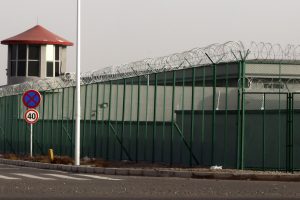On July 9, the U.S. Treasury Department announced that it was sanctioning Chinese government officials “for their connection to serious human rights abuse against ethnic minorities in Xinjiang, which reportedly include mass arbitrary detention and severe physical abuse.”
“The United States is committed to using the full breadth of its financial powers to hold human rights abusers accountable in Xinjiang and across the world,” Treasury Secretary Steven T. Mnuchin said in the press release.
Most notably, the sanctions hit Chen Quanguo, the top Chinese Communist Party (CCP) official in Xinjiang, whose arrival at that post in 2016 coincided with the draconian new controls on the native Uyghur population and other Turkic Muslim minorities. Under Chen’s watch, the government has forced an estimated 1 million Uyghurs, Kazakhs, Kyrgyz, and others into camps, where they are forced to speak in Mandarin, praise the Communist Party, and renounce their Muslim faith. China has also rolled out a dystopian surveillance network, across Xinjiang, including the forced gathering of biometric data like DNA samples and iris scans.
Beijing has strenuously denied any human rights abuses, claiming the camps are “vocational training centers” and the restrictions are necessary to combat terrorism.
Also sanctioned was Zhu Hailun, formerly Chen’s second-in-command as the deputy Party chief in Xinjiang. The “China Cable” investigation by the International Consortium of Investigative Journalists (ICIJ) labeled Zhu the “architect of mass detention in Xinjiang.”
“The confidential government documents that show China’s plans for sweeping extrajudicial detentions and internment camps in Xinjiang are all signed by one man: Zhu Hailun,” ICIJ reporter Sasha Chavkin wrote.
The U.S. Treasury Department also sanctioned the Xinjiang Public Security Bureau (XPSB), “as well as the current Director and Communist Party Secretary of the XPSB, Wang Mingshan, and the former Party Secretary of the XPSB, Huo Liujun.”
The sanctions block any of the named officials from owning property or investing in the United States – or doing business with U.S. entities operating anywhere around the world.
Even amid a trend of worsening U.S.-China relations, the latest step stands out. Despite longstanding criticisms of China’s Communist Party for human rights abuses, it’s rare for Chinese officials to be hit with Magnitsky Sanctions. That’s only happened once previously, in the case of Gao Yan, who was director of the Beijing Public Security Bureau Chaoyang Branch where lawyer and human rights activist Cao Shunli died in custody in 2014. Other sanctions targeting Chinese citizens have instead been justified by economic espionage charges or accused violations of U.S. sanctions on Iran or North Korea. And no previous sanctions have targeted an official as high-ranking as Chen, who is a member of the CCP’s Politburo, the top 25 officials in China.
The new sanctions definitively up the ante for U.S.-China tensions. As of this writing, China had not yet responded, but retaliation is assured.
In another sense, though, the latest announcement is just the culmination of years of pressure from the U.S. Congress for the Trump administration to take action. Members of Congress had been calling for Magnitsky sanctions in response to China’s crackdown in Xinjiang since 2018. Other administration officials, including U.S. Ambassador for International Religious Freedom Sam Brownback, had been urging sanctions as well.
But U.S. President Donald Trump told Axios’ Jonathan Swan last month that he held off on enacting sanctions because “we were in the middle of a major trade deal… And when you’re in the middle of a negotiation and then all of a sudden you start throwing additional sanctions on…” Trump left the thought unfinished, before claiming that the tariffs his administration had enacted on Chinese goods “are far worse than any sanction you can think of.”
Former U.S. National Security Advisor John Bolton alleged in his recent memoir that Trump had told President Xi Jinping “that Xi should go ahead with building the camps, which he thought was exactly the right thing to do.” Trump has denied this.
Last month, Trump signed the Uyghur Human Rights Policy Act into law. He had little choice but to do so — the bill had passed both houses of Congress with only one dissenting vote. The act requires the president to submit a report to Congress each year identifying figures responsible for a litany of human rights abuses against Uyghurs, including torture and “prolonged detention without charges and trial.” The administration then must impose sanctions on those figures, including asset blocks and refusing U.S. visas.
Previously, the United States had sanctioned a total of 37 Chinese entities (28 in October 2019 and another nine in May 2020) for “engaging in human rights violations and abuses” or “enabling China’s high-technology surveillance” in Xinjiang.































